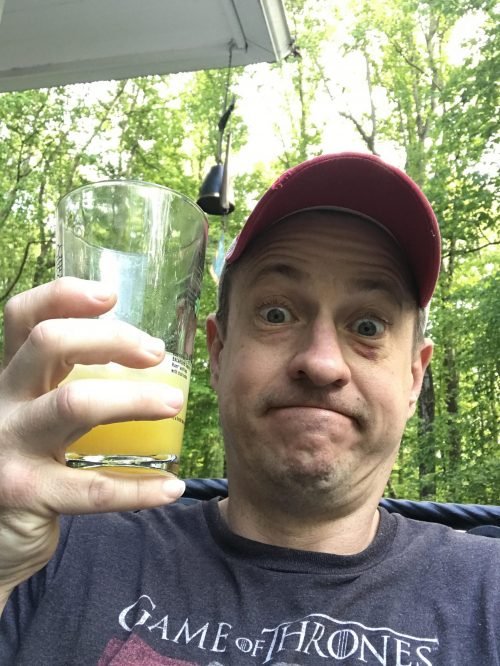
5 Questions with Ben Woodard, Business Development Partner, ABIO
“5 Questions With…” is a weekly BioBuzz series where we reach out to interesting people in the BioHealth Capital Region to share a little about themselves, their work, and maybe something completely unrelated. This edition features 5 Questions with Ben Woodard, Business Development Partner, ABIO.
Ben Woodard is a recent retiree of the University of Maryland, where he was the Executive Director of the Biotech Research Program (BREP) for over a decade. In his 23+ year career at BREP he managed hundreds of biopharma research projects for nearly every company in the Bio-Health Capital Region. A champion of undergraduate training and workforce development, his biopharma undergraduate classroom prepared hundreds of students for careers in biotechnology. You would be hard-pressed to find a regional company that does not employ one of his graduates.
Ben is currently a partner and Director of Business Development at ABIO, an owner’s representation company for biopharma and the life sciences that leverages project management and technical services to support cGMP projects and operations. ABIO employs several of Ben’s former students, one of which includes ABIOs principal, Nate Forrest. While pursuing his new opportunity, Ben continues to mentor former students, assisting with resume-building, networking, and interview skills to prepare them for careers in biopharma.
1. You’ve been in the Biotech space in Maryland for over 20 years, Please walk us through your career
Oh man, I’ve had a very circuitous route to biopharma. I absolutely loved drafting and architecture in high school, and that was the path I pursued at Miami (the U). On my third day at The U, I got robbed at gunpoint, which scared the hell out of me, and subsequently led to my transfer to Penn State (York Campus). After three semesters of overpaying for out of state tuition, I decided to roll back home and finish pre-med in College Park. Then organic chemistry happened, and med schools don’t search for students who couldn’t get through the weed out courses.
So I settled down into biology with a goal to become a brewer, thinking “let me just get through UMCP, move to Germany, and get a Masters of Brewery Sciences”. Not learning my lesson from organic chem, I yet again, found myself on the receiving side of not quite a passing grade.
I was always told, if you don’t speak up, no one will hear you. So I walked into Ann Smith’s office with a plan to convince her that my effort was “C-worthy”. We chatted, and she asked about my aspirations, I told her of the Germany plan and she said, “there’s a fermentation lab in ChemE, they need some student employees you should go talk to Terry Chase”. Ann still stuck with the D, I had to retake Microbio, but subsequently landed a job at the BSF (Bioprocess Scale-Up Facility).
I honestly knew nothing about biopharma. I had no idea that the same equipment used to ferment beer could be used to produce a life-saving molecule. I fell in love with academia while working at the BSF. The constant change was invigorating. Always new projects with a revolving staff. Every day was something new. I was fortunate enough to have my path end up there.
I look back and wonder if I hadn’t gotten robbed in Miami where I would be? I guess I’m a supporter of Chaos Theory. It’s crazy to think if that event never happened, the lives of a few hundred others, including my children would have been changed. But here we are!
2. Talk about your new role with ABIO and what you aim to accomplish
First off, I am thankful to Joe Morin and Nate Forrest for the opportunity. Nate was a student of mine for three years in the early 2000s. I feel fortunate to have made an impact on his life, one that put him in a position to offer me a job. That being said, I was their 13th employee when I was brought on in October as their lead for business development. Additionally, I manage a few projects and am working to implement their technical recruiting and staff augmentation division.
We have a lot going on – Operation Warp Speed is challenging our region, we’re working with a good number of companies from large pharma through mid-sized and regional startups. Our services are focused on guiding our clients smoothly into cGMP operations, whether we’re starting with them at the initial idea or joining along the process. With significant owner’s side experience in the life sciences, combined with strong project management and technical skill sets, we’re in a unique position to ensure folks actually get what they intended when they started.
Additionally, we support process/utility engineering, automation, supply chain, and general operational efforts. We plan to roll out our technical recruiting services by mid-January and have another new service offering by Feb with a key new hire joining the team at the turn of the year. With new clients in the Boston area, we are hoping to expand our presence in that region by the end of Q1. Bottom line – we’re expecting a lot of growth in 2021, but pushing hard to make sure that the quality ABIO has become known for perseveres. It’s an exciting time to be in biotech. We have a long way to go to get a COVID vaccine into everyone, and the other diseases that our BHCR companies are working on aren’t taking a break.
3. What has been the most fulfilling part of your career so far? Tell us about it
I’ve always said if you asked me in high school if I ever thought I’d be a teacher, I’d say never in a million years. And now, it’s something that was the most rewarding part of over half of my life. The number of students that I have had the privilege to teach and mentor is the real shining star in my career. I still get thank you letters, they buy me a beer at Looney’s, send holiday texts, but they need to know it was a two-way street.
The best students never realized that their interactions with me made the class more interesting for everyone. Their genuine interest made it fun to teach, I loved creating new ways to convey messages. One of my favorite lectures to date is a gas transfer lecture where I poured a Guinness and used the cascading bubbles to talk about eddies and Reynolds number. It’s easy to teach when students want to learn, and I was fortunate that biopharma became my expertise and students wanted to know more about it.
The best single day was just over the summer. It would end up being the last class I taught at UMD. I hosted a “Scientists in Bars Drinking Beers” session and wanted to focus on females in pharma, so I asked three powerful women to join our panel. Martha Connolly, Virginia Crews, and Jess Tsaoi.
Halfway through the talk, one young woman in the class asked some questions about self-worth, how to have confidence, and the challenges of being a woman in a male-dominated industry. I sat back and watched them talk for a few minutes. At the end of their conversation, I was speechless. There was nothing else I could add to that conversation but to be a part of it, to witness true encouragement, and to see the confidence build, live and in-person, one of the true highlights of my career.
4. As somebody who has been part of the BioHealth Capital Region since before it even had that title, What are the biggest gaps here, AND how would you fill them?
I have always been a proponent of workforce development and champion of undergraduate biopharma education. I’ve thrown a few ideas out there on how to better the region’s pipeline, the solutions are obtainable, but won’t come without financial backing. We just witnessed UMD close BREP in the middle of a pandemic. Priorities are residing in silos and no one knows what the others need. We need a team of corporate leaders (big and small caps) to sit down with STEM educators (middle school to 4-year University), to figure out a plan to fill the needs of BHCR. There are not enough local bodies to fill the roles needed to support the industry.
We need middle and high schools to work with higher education to demonstrate the value of a career in biotechnology. We need classes dedicated to the research, development, manufacturing, validation, and quality systems that are necessary to produce these life-saving medicines. Look at BTEC in NC State, they do it right. That is far from cheap, yet has buy-in from all of the players in that region. Until we find a true academic champion with the necessary financial backing that can lead the development of those core competencies in a lab setting, I think we continue to struggle to fill those gaps.
5. If You Could Learn Any One Skill in The World Without Trying, Which Would You Pick and why?
Haha, this is a very poignant question for me. My wife bought me a subscription to Master Class for Christmas. I’m watching these incredible individuals tell their secrets and let you into the nuances of their craft. I’ve always wanted to skateboard and play guitar. MC has Tony Hawk and Tom Morello teaching their respective expertise. So I wouldn’t wish for a magic wand to make me something without trying, I’ve always been a person who just does it.
Learning is an experience that makes the master. Just roll up your sleeves and do the task. So I plan to buy a skateboard and try to not kill myself. I’ll try that first since they are much less expensive than a bass guitar. If Tony Hawk can teach a 47yo man to skateboard, I will certainly give Morello a chance to teach me a bass. By the way, hopefully, you all get Master Class. If not, be prepared to get Vossed by me in 2021.
Thank you to Ben Woodard for participating in the ‘5 Questions with BioBuzz’ series and stay tuned for more interviews with others from across the BioHealth Capital Region and beyond.




